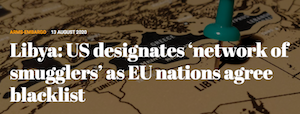The US Department of the Treasury has imposed sanctions against three people and a company based in Malta, in a crackdown on what it said was ‘a network of smugglers contributing to instability in Libya’.
Following suit, and declaring their own support for a 2011 UN arms embargo that has been all but ignored for years, France, Germany and Italy agreed on a list of companies and individuals targeted for sanctions related to transporting weapons to Libya in violation of the embargo.
The US Treasury Department said that its Office of Foreign Assets Control (‘OFAC’) has designated Libyan national Faysal al-Wadi, for allegedly smuggling drugs and contraband Libyan fuel into Malta. Two associates, Musbah Mohamad M. Wadi and Nourddin Milood M. Musbah, were also blacklisted, together with the vessel Maraya that the men are accused of using for their smuggling operation. Treasury said it had also designated Malta-based company Alwefaq Ltd.
‘Competition for control of smuggling routes, oil facilities, and transport nodes is a key driver of conflict in Libya and deprives the Libyan people of economic resources,’ the Treasury Department said.
Meanwhile, Germany’s DPA news agency reported that France, Germany and Italy had agreed on a list of companies and individuals that are suspected of providing ships, aircraft or other logistics for the transfer of arms to Libya. It quoted unidentified EU sources as saying that three companies, from Turkey, Jordan and Kazakhstan, as well as two individuals from Libya, are on the list.
In mid-June, the three EU Member States warned they ‘are prepared to consider a possible use of sanctions if infringements against the land, sea and air embargo continue,’ but without mentioning any state or entity that would be targeted.
The EU recently established a dedicated naval mission named Operation Irini to enforce the embargo.
Fighting in the oil-rich country, in turmoil since the overthrow of Muammar Gaddafi in 2011, intensified last year when the renegade general Khalifa Haftar’s Libyan National Army (‘LNA’) in the east launched a campaign to unseat the UN-recognised Government of National Accord (‘GNA’), led by Prime Minister Fayez al-Sarraj in Tripoli.
Both sides have been heavily armed by outside forces. The Tripoli government is backed and armed mainly by Turkey, while Haftar’s forces have been armed and supported by the United Arab Emirates (‘UAE’), Egypt, Jordan, Qatar and Russia, in what the UN has called ‘blatant violations’ of the embargo.
The United States has recently shown renewed interest in the region following reports that Russia was expanding its role in Libya’s civil war.
For their part, Germany, France and Italy are especially keen on bringing an end to the fighting in Libya because the turmoil has contributed to the numbers of migrants crossing the Mediterranean Sea and reaching European shores.
https://www.state.gov/the-united-states-sanctions-network-threatening-the-security-of-libya/




